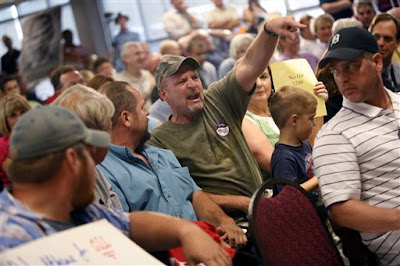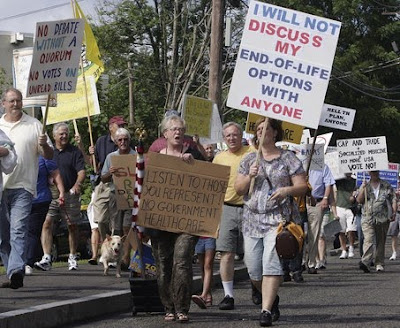 Strangers on a Train
Strangers on a TrainReleased: June 30, 1951
Directed by: Alfred Hitchcock
Starring: Farley Granger, Ruth Roman, & Robert Walker
Plot in a Nutshell:
Two strangers meet on a train. Both are having problems with somebody that they wish could just disappear. Bruno (Walker) has a father who rules over his life, and Guy (Granger) has a wife he'd like to divorce so he can move on but she refuses to agree. Bruno suggests they murder the other's problem, that way, they'd both have no motive and they could have realistic alibis. Guy turns him down and shrugs it off, but Bruno goes through with it killing Guy's wife. Does Guy go through with it, and if he doesn't, what ends will Bruno go to make sure he doesn't take the blame?
What I thought:
I really enjoy Alfred Hitchcock presents. It was an old TV show back in the early days of the format, where Hitchcock would present a short 30 minute story filled with his usual staples: murder, mystery, suspense, contained within a clever yarn. They are great bite-sized pieces of a master storyteller at work. About halfway through Strangers on a Train I began to feel that it was a story that was better suited to that 30 minute limitation of television. But my mind quickly changed by the conclusion of the film.
This is a very simple set-up, Two men meet, a scheme is hatched, and over the course of the film, the cards come crashing down. It seemed very cut and dry. That's why I felt it shouldn't have been a feature length film. The things it was reaching for seemed very rudimentary. There really was no sense of suspense or great build up. The characters just seemed to be, and not do. But then something happened. The film twisted and ceased to be about whether or not a man was going to commit to murder and morphed into a story where a man was desperately trying to keep from being framed for a murder he didn't commit. By all accounts, Guy should have been the one to kill his wife, he had a motive, a shoddy alibi, and no real credible story. He couldn't tell the police, Bruno would have denied the whole thing. So about 2/3rds of the way through you realize the picture is much more dangerous than initially thought.
 The two leads are not very good, but I don't think it is the fault of the actors. Both Granger and Walker perform fine, but they don't seem to bring anything with them. It is the fault of the screenwriter that the characters are not very detailed or deep. There are no layers to their conflicts or circumstances. Guy is an upstanding citizen tennis player who tries to do things right. Bruno is a man suckling from his parents' teat too long and wishes daddy could just go away. Those may sound like interesting characters, but believe me they aren't, and there is very little beyond that. I wish more could have been made out of them, and I never really cared for either one.
The two leads are not very good, but I don't think it is the fault of the actors. Both Granger and Walker perform fine, but they don't seem to bring anything with them. It is the fault of the screenwriter that the characters are not very detailed or deep. There are no layers to their conflicts or circumstances. Guy is an upstanding citizen tennis player who tries to do things right. Bruno is a man suckling from his parents' teat too long and wishes daddy could just go away. Those may sound like interesting characters, but believe me they aren't, and there is very little beyond that. I wish more could have been made out of them, and I never really cared for either one.But let's be honest, this isn't a Robert Walker movie or a Farley Granger picture. This is Hitchcock, and he more than brings his skill to play here. I have no idea how he is so able to effectively create such great moods and chilly vibes with just simple understated shots and slow deliberate pacing. It is amazing. The finale literally had me on the edge of my seat. Even though it was absolutely preposterous and very unnatural, Hitch had me glued. And there is no greater testament to the man, than his ability to turn around such an unexciting premise into something very watchable.
 Anybody who can take a mediocre story, with bland characters, and infuse it with as much tension as he does, is a true master storyteller. This is a Hitchcock film that doesn't disappoint, even though it seems that it might. I was more than ready to give up on this flick, but it was able to squeak up a notch or two by the end, all thanks to Alfred Hitchcock.
Anybody who can take a mediocre story, with bland characters, and infuse it with as much tension as he does, is a true master storyteller. This is a Hitchcock film that doesn't disappoint, even though it seems that it might. I was more than ready to give up on this flick, but it was able to squeak up a notch or two by the end, all thanks to Alfred Hitchcock.(And yes, that is a spinning out of control merry-go-round pictured above that our two characters are fighting on. It gets THAT silly.)
Bottom Line:
Dull characters inhabit a simple and sometimes silly story, but under the direction of Hitchcock, it manages to make up for it's deficits.
B+ Sphere: Related Content

















